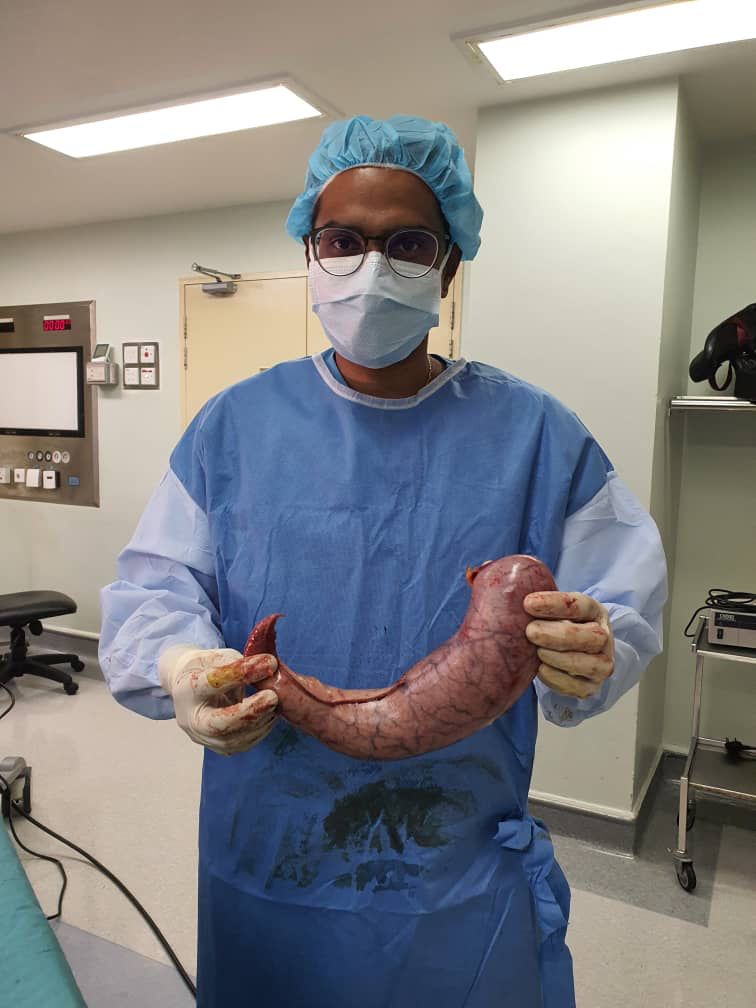Fit, Fat or Obese?


By SeeFoon Chan-Koppen
The standard medical yardstick for determining whether you are fat or obese is by looking at your BMI (Body Mass Index) which is a person’s weight in kilograms (or pounds) divided by the square of height in meters (or feet).
Anybody with a BMI higher than 23 is considered pre-obese and beyond 25.5, you’re on your way to becoming categorised as obese which on its own has different levels and very often comes with a slew of medical conditions like Hypertension, Diabetes, Sleep Apnea, Heart Diseases, Arthritis and Joint problems.
According to Dr. Satkunan Mark, “we also see patients coming in with Secondary Infertility and see patients with Polycystic Ovarian diseases. Of late we find these patients tend to be depressed. When we look at it, almost every system in your body is affected by Obesity”


Dr Mark graduated from Manipal Academy of Higher Learning in 2004, followed by a Masters in General Surgery from University Science Malaysia. He then went on to complete his training in Laparoscopy (minimal access surgery) with a Diploma from Strasburg, France and then with his interest with Bariatric (includes a variety of procedures performed on people who are obese) and Metabolic Surgery, he pursued a fellowship program in Bariatric and Metabolic Surgery in King Chulalongkorn Medical University, Bangkok.
Dr. Mark is currently a General Bariatric Surgeon at Fatima Hospital, Ipoh and an adjunct lecturer in Surgery for University Kuala Lumpur Royal College of Medicine, Perak (UNIKL).
Apart from minimal access surgery, he also has a keen interest in clinical nutrition. As Chairman of the Medical Association Perak Branch, the Secretary of the Malaysian Hernia Society, Committee Member of the Endoscopic and Laparoscopic Surgery Society of Malaysia, Dr. Mark has a full schedule.
“Let’s talk about Obesity and Bariatric Surgery. Obesity has been a major health concern, not only in Malaysia but world wide data shows that Obesity is the leading cause of many diseases . We are in fact one of the biggest nations in South East Asia and as well as Asia to have this problem.
1 in 2 of the population here in Malaysia is either Obese or overweight. When we look at gender, 65% of ladies tend to be overweight or obese. When we talk about race, Indians tend to predominate. We see many Indians diagnosed with obesity and obesity related diseases”.
Why is obesity and treating obesity related diseases so important? “There is a lot of hype about it. The Ministry of Health does recognize that obesity is a major problem. There is a lot of time, effort and energy being put into creating awareness about obesity, treating patients, and prescribing the right form of treatment, particularly Bariatric Surgery.


Why does Obesity occur? “Very simply put in its simplest form, there is an imbalance between your energy intake (that is your food) and your energy expenditure (which is your exercise or activities). Narrowing it down, the more food you take and the less active you are, that excess energy will be converted to fats and that will lead to obesity. As more and more research is being done, we find that there is more to this problem. We find that patients who are chronically obese for years, have their internal wiring for their metabolism, for their fats, hunger hormones, their desire to eat…. all have been altered by obesity,” he added.
So, it is basically, treating these changes in your body that leads to successful outcomes? “When we look at treating obesity, the first thing we have to understand is Body Mass Index.You are considered (Overweight) if your BMI is 23 – 24.9; If your BMI is 25 – 27.9 you are considered to be in the (Pre – Obese) stage and you are Obese if your BMI is over 28.
“Bariatric Surgery is not something new. It has been around for about 40 to 50 years but with the advent of Laparoscopic or KeyHole Surgery, we find that patients recover much faster. We can carry out these surgeries through these small key holes and success rates are indeed very high.
Most of us here in Malaysia, perform 2 major surgeries for weight loss. One is Sleeve Gastrectomy and the other is Gastric Bypass. Both are effective in weight loss; it is safe, provided it’s done properly and the whole process is done in a thorough and planned manner.
Sleeve Gastrectomy basically is a procedure where the stomach is tubularized, from a 1.5litre capacity, and is stapled into a small gastric tube of about 30 to 40 ml. Food intake is less and that in turn, gradually over the next 6 months to 2 years, you will gradually lose weight.
“When we talk about weight loss from Sleeve Gastrectomy you can lose up to 40% to 50% of your excess weight. On an average you may lose anywhere between 25 to 35 kilos in a span of 2 years. It is safe and successful. After the 2-year mark, your weight tends to plateau and that is when you need to be vigilant and maintain your diet and exercise.


Gastric Bypass is a more complex surgery where we convert the stomach into a small pouch and we bypass the stomach by attaching a segment of the small intestine to that newly created pouch. What happens is, food that enters your newly created stomach pouch directly enters your small intestine. A little more complex but a very effective surgery. You may lose up to 60% – 80% of your excess weight. When we look over a 5-year period, you may lose up to 50 or 60 or even 70 kgs of your weight.
Another added benefit we found through research, is a very high success rate in treating patients with Diabetes, Sleep Apnea and Heart Conditions. Globally, research shows an average 70% to 85% of patients can go off diabetic medications once this surgery is done.
“There is a very high success rate and it is very safe. Due to the high success rates, many patients are prescribed surgery. Here in Perak, I perform my surgeries in Fatimah Hospital. There is also Bariatric Surgical Services in Raja Permaisuri Bainun General Hospital Ipoh. These are the 2 main hospitals where Bariatric Surgery is offered.
“A patient that comes to us will first need to undergo a detailed consultation and counselling from the operating surgeon. We take a very detailed history of your past and present and what are the methods that you have tried to use to lose weight. We look at your dietary habits and medical conditions. It is a very detailed session which you will undergo even before the surgery.
“Following which we will need to do some blood work, chest x-rays, ECG’s, a stomach scope, an Endoscopy of your stomach to make sure there are no other problems. We also do an ultrasound of your abdomen, to make sure there are no gallstones or tumours as such.
“For those with Sleep Apnea, we will need to do a sleep study before the surgery to assess how bad your Sleep Apnea is. Once all the work has been done, we will then call you up again for another detailed discussion into the type of surgery which will best suit you and benefit you the most.
“We will also discuss the complications, pre-operative preparations, and post-operative preparations. We also must retrain patients on the way to eat, the way to drink for the next 5 years.
There is much research that has been done over the past 20 – 40 years which shows patients that undergo Bariatric surgery, have some altered eating behaviors. Most of them tend to feel less hungry and get the full feeling easily and then to show less tendency towards sweet foods, carbohydrates and desserts. They also tend to prefer more healthy food. In short, this surgery can rewire your internal hormonal, neuronal and little intricate systems which have been altered because of obesity. “We also find patients who undergo Gastric Bypass tend to have improvement or reduce pathological hedonist hunger which is very important. We also find that Bariatric Surgery is positively able to cure diabetes, improve heart conditions, improve your weight and hence reduce pressure on your joints.
What about those who do not qualify for surgery or those who are afraid of surgery? “Yes, we have other methods, such as the Intra-Gastric Balloon, where a balloon is inserted into your stomach and this balloon will occupy space in your stomach for a duration of 4 months, creating a sense of fullness. Anything you eat, you will tend to feel full easier and faster. This will help you lose weight within the next few months.
“In the past balloons have come in various types and forms but of late, we have this one balloon where it’s very soft and very easily inserted. This can be done on an out-patient basis without any sedation. The entire procedure will only take 6 to 8 minutes. This particular balloon comes pre-packed in the form of a pill (roughly 1 centimetre). All you need to do is swallow this pill, and as this pill hits your stomach, we will take an x-ray to confirm its position. There will be a tube attached to this pill which will be sticking out of your mouth, we will infuse some fluid into this tube, which will gradually expand this balloon. Once this balloon is expanded to about 500ml, we will then pull the tube out and the balloon will seal shut and remain in your stomach for about 4 months.
“An average patient can lose somewhere between 10 to 15 kgs during that 4 months. Once the 4 months are over, there is a mechanism where this balloon ruptures on its own and crumples back into the size of the original pill and exits when you pass motion. This is a very effective form of weight loss and can be combined with weight loss medications to further enhance the weight loss. Patients who have expelled this pill, may go for the second pill to continue this weight loss.
“Another form of weight loss method is through the injection of Liraglutide, a medication which suppresses your appetite and is able to reduce 8 – 10 kgs of weight loss. Having said that, these must be incorporated with dietary changes and exercise.
It is very important for the public to understand the importance of Bariatric surgery and obesity because if we tackle these problems early, the outcome is more favourable and provides better patient outcomes.
For More Information :
Dr. Mark Surgical Clinic
Wolfgang Suite 09, 1st Floor, Hospital Fatimah
Lebuh Chew Peng Loon, Off Jalan Dato’ Lau Pak Khuan
Ipoh Garden, 31400 Ipoh, Perak
Dr. Satkunan Mark


